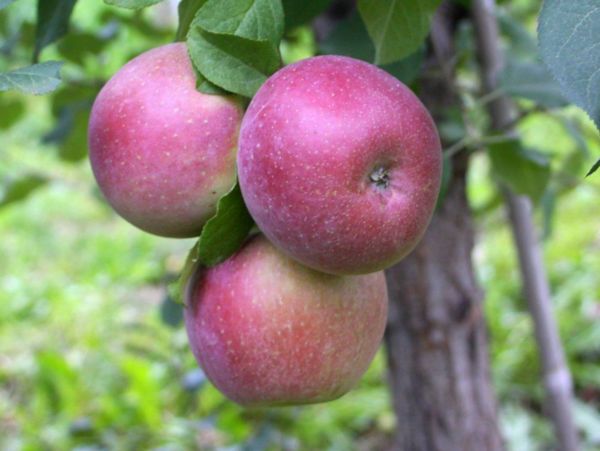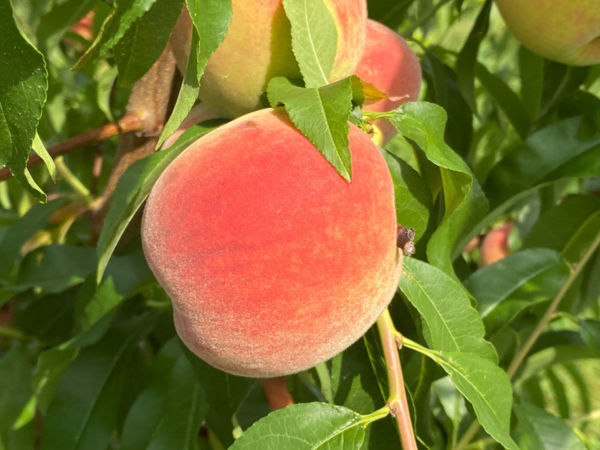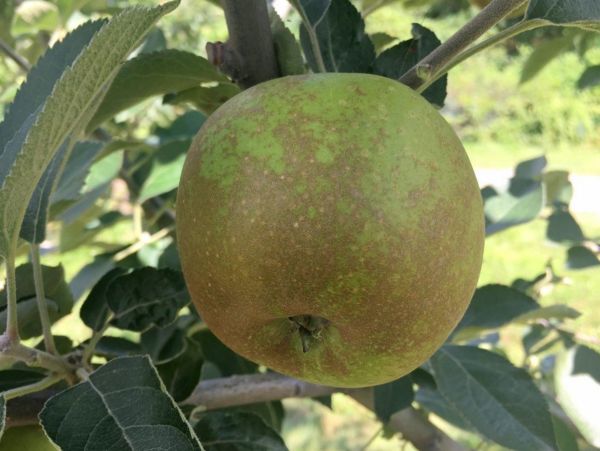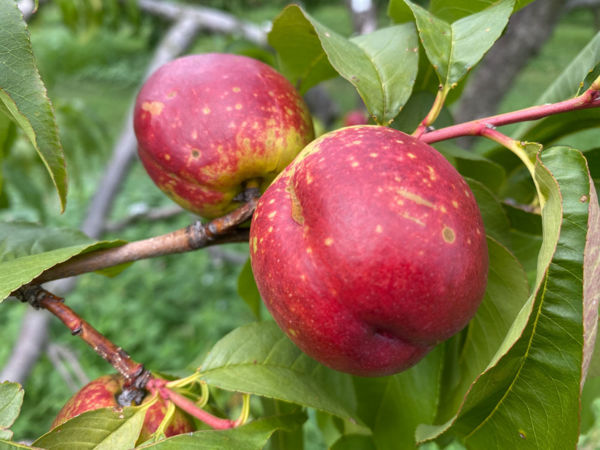An attractive, highly disease-resistant apple, ideal for organic growers.
Fuji Apple Scionwood (Spring 2024)
An extra sweet, crisp dessert apple that stores well.
A vigorous, productive, spreading tree, Fuji is somewhat bushy and tends to biennialism; it will benefit from early thinning and detailed annual pruning. It is a somewhat problematic tree, slightly susceptible to fireblight, scab, cedar-apple rust, bitter rot, and Alternaria spot. It is also susceptible to blister spot, but this is a cosmetic issue that will be of concern only to commercial growers. Fuji thrives in low-chill climates and has become a commercial favorite in California. It tends to develop watercore, which is considered a desirable feature in the Japanese market.
The apple is large and blockish. It is striped pink over a yellow background, and the flesh is very fine grained, snappy, and juicy. The flavor is ridiculously sweet with no detectable acid. In Apples of Uncommon Character, Jacobsen observes hints of lychee, mango, and cantaloupe, and he goes on to note that while apple snobs may reject the lack of acidic balance, Fuji is, nevertheless, the most produced apple in the world (occupying 70 percent of the Chinese market), thus demonstrating that the world in general "loves sweet apples." Fuji stores well and will keep its flavor for over three months in regular refrigeration. This is an excellent late-season fresh eating apple that pairs well with strong cheeses and makes a very sweet sauce.
Fuji is named after Fujisaki, the Japanese town where it was bred.
Volume Pricing
| Quantity | Fuji Apple Scion |
|---|---|
| 1 | $12.00 |
| 2-5 | $7.00 |
| 6-10 | $6.00 |
| 11-99 | $5.00 |
| 100+ | $4.00 |
The Fruit
Fruit Type
Category: Apple
Subcategory:
Hot-Climate
Fruit Uses & Storage
Uses: fresh eating, storage, sauce
Storage duration: three plus months (approximate, depending on storage conditions)
Fruit Appearance
Skin color: red
Flesh color: cream
Fruit Origins
Parentage: Ralls Janet x Red Delicious
Origin: Japan
Introduced in: 1962
Introduced by: Tohoku Research Station
The Environment
Calendar & Geography
USDA zones: 5 - 8
Chill hours: 500
Ripening date: Nov 03 (approximate, in New York State) + 49 days after McIntosh
Diseases & Pests
glossary
Alternaria Leaf Blotch: Susceptible
Apple Blister Spot: Very Susceptible
Apple Scab: Susceptible
Bitter Rot: Susceptible
Cedar-Apple Rust: Susceptible
Fireblight: Susceptible
Pollination
Pollination Factors
glossary
Bloom group: 3
Is it self-fertile? N
Is it fertile? Y
Ploidy: Diploid
Pollination Partners
This table shows the first few results from a full search for pollenizers of Fuji Apple. Please see our Pollenizer Search to run other queries and read how the application uses various factors. Also read more about fruit tree pollination.
| Tree | Currently in Stock |
|---|---|
| Virginia Crab Apple | 0 |
| Florina Apple | 0 |
| Porter's Perfection Apple | 0 |
| Elstar Apple | 0 |
| Rubinette Apple | 0 |
| St. Edmund's Russet Apple | 0 |
| Spitzenburg Esopus Apple | 0 |
| Liberty Apple | 0 |
| Mother Apple | 0 |
| Binet Rouge Apple | 0 |
| Freyberg Apple | 0 |
See all pollination matches for Fuji Apple
Featured Products
A few things we're loving right now...
A full-flavored, freestone white peach.
One of America's oldest apples, good for storage, baking, and cider.
A widely-grown, large, yellow-fleshed nectarine.


















